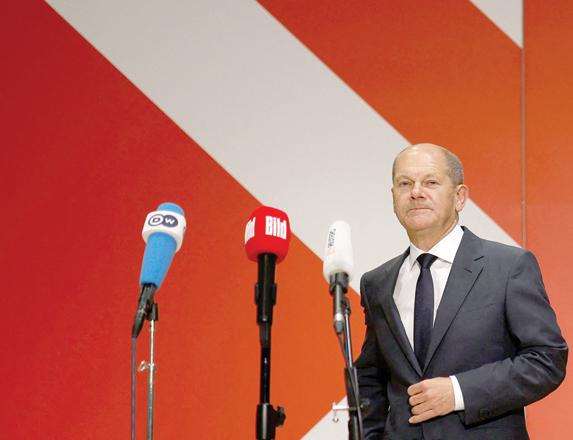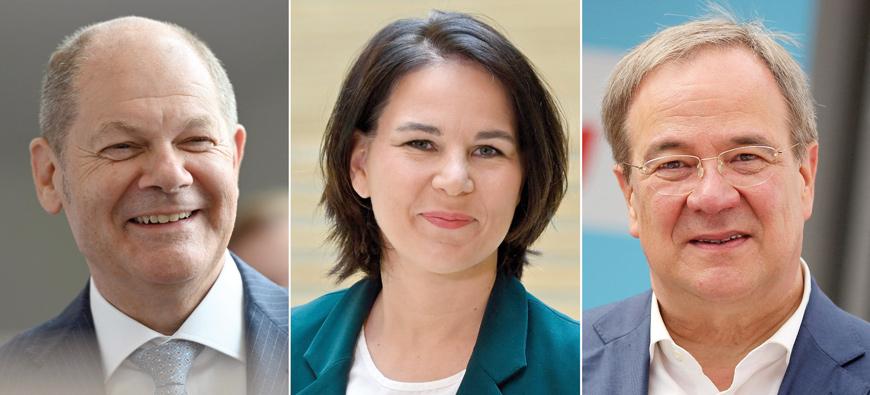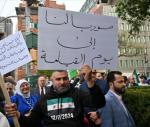You are here
Germany a step closer to Scholz-led gov't
By AFP - Oct 06,2021 - Last updated at Oct 06,2021

German Finance Minister, Vice Chancellor and the Social Democratic SPD Party's candidate for chancellor Olaf Scholz arrives to give a press statement at the headquarters of the SPD in Berlin, southern Germany, on Wednesday (AFP photo)
FRANKFURT — Germany inched towards a government led by Olaf Scholz after the Greens and the liberal FDP party said Wednesday they would try for a three-way tie-up with his Social Democrats while shunning Chancellor Angela Merkel's conservatives.
The two kingmaker parties' decision sends the CDU-CSU bloc closer to the opposition, in a major shift for the country after 16 years of Merkel's centre right-led government.
The political upheaval in Europe's biggest economy was unleashed by a September 26 general election which Scholz's party won with 25.7 per cent, followed by Merkel's CDU-CSU alliance at 24.1 per cent.
For either party to head the next German government it would need the support of the centre-left Greens and the pro-business Free Democrats (FDP), which came third and fourth.
"Voters have given us a mandate to build a government together," Scholz told reporters.
The first three-way talks between the SPD, FDP and Greens will take place on Thursday.
Beleaguered CDU leader Armin Laschet, who led the conservatives to their worst-ever election result, insisted however he still had a shot at the top job.
The conservatives "respect the decision" by the two kingmaker parties, Laschet said, but added that the CDU-CSU is "still ready to hold talks".
Markus Soeder, who heads the CSU sister party to the CDU, gave a more sobering assessment, saying the possibility of a CDU-CSU government had essentially been "rejected".
The conservative bloc must now prepare itself for a stint in opposition after four Merkel-led coalitions, he said.
"This will change our country," Soeder said.
Recent surveys suggest most Germans want Scholz, who is also finance minister and vice chancellor, to become the next leader of Europe's top economy.
'Building bridges'
Green co-leader Annalena Baerbock said that after preliminary discussions with the SPD and CDU-CSU, the Greens "believe it makes sense" to focus on a tie-up led by the Social Democrats.
Baerbock said Germany faced "great challenges" and needed "a new beginning".
"This country can't afford a lengthy stalemate," she said.
FDP leader Christian Lindner said his party had accepted the Greens' proposal to swiftly move on to formal exploratory coalition talks with the SPD.
There would be "no parallel talks" with the conservatives, he said.
The Greens and the FDP are not natural bedfellows, diverging on key issues including taxation, climate protection and public spending.
But both parties have said they want to “build bridges” in order to govern.
All sides are eager to avoid a repeat of the 2017 election aftermath, when the FDP dramatically walked out of coalition talks with the conservatives and the Greens and it took months for a new government to take shape.
‘Not a done deal’
A tie-up of the SPD, Greens and FDP, which would be a first in Germany, has been dubbed a “traffic light” constellation after the parties’ red, green and yellow colours.
Green co-leader Robert Habeck said that while the party shared some common ground with the conservatives, there are “significant differences” too.
Informal talks over the last few days revealed “more overlap” with the Social Democrats, he said, including on climate protection, social justice and European integration.
Wednesday’s developments will likely to put more pressure on Laschet, whose political future hangs in the balance.
Gaffe-prone Laschet, once seen as a shoo-in for the chancellery, fell out of favour with voters after he was caught laughing during a tribute to victims of Germany’s deadly floods in July.
The FDP however threw Laschet a lifeline by suggesting the conservatives were still in the running should the “traffic light” talks fail.
The FDP’s Lindner said a coalition with the CDU-CSU and the Greens, dubbed a “Jamaica” alliance because the parties’ colours match that country’s flag, “remains a viable option for us”.
The FDP has served as the junior partner in a conservative-led government before, and they share a dislike for tax hikes, red tape and a relaxation of Germany’s strict debt rules.
The Green’s Habeck also cautioned that “nothing is a done deal yet”.
Merkel herself is bowing out of politics, although she will stay on in a caretaker capacity throughout the coalition haggling.
Related Articles
BERLIN — Germany's centre-left Social Democrats (SPD) edged ahead in the race towards September elections on Tuesday, beating Angela Merkel'
BERLIN — Germany's outgoing Chancellor Angela Merkel on Tuesday distanced herself from Finance Minister Olaf Scholz, saying there was "a hug
BERLIN — Chancellor Angela Merkel's conservatives and the centre-left Social Democrats were running neck-and-neck in Sunday's vote to decide
















